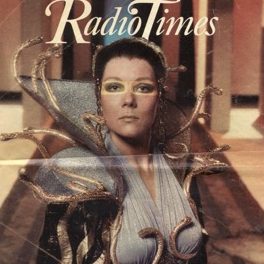It’s not often that the ancient Greek adulteress and murderer graces the cover of the Radio Times – still less often does she wear a costume that combines Minoan art with Doctor Who. But Diana Rigg’s 1979 performance as Clytemnestra was just one of dozens of extraordinary TV events enjoyed by audiences in Britain between 1958 and 1990. During these years, British TV channels regularly screened productions of Greek tragedy, beaming the ancient stories of war, revenge, and heroism directly into the home. In spring 2017 the Department of Classics at the University of Reading is hosting a unique opportunity to watch three films of Greek tragedy that were first shown on the small screen.
Our films are carefully chosen to pursue the theme of the Trojan War and its aftermath. We follow the story from the sacrifice of Agamemnon’s daughter Iphigenia, which permits him to lead the Greeks to victory in the war, through the return of Agamemnon to face his vengeful wife, and finally into the next, doomed generation, where another daughter, Electra, waits to take her revenge in turn. We have managed to obtain the coveted ‘F’ rating for all these films, since they all have central female roles, and one was also directed by a woman.
Our first screening is Iphigenia at Aulis, the 1990 production directed by Don Taylor. This was Taylor’s last drama for the BBC and also, apparently, the last Greek tragedy shown on British television. Taylor’s translations of the Iphigenia at Aulis and other plays by Euripides continue to be popular. The film was shot by multiple cameras in continuous action, in a studio rather than on location, so there were challenges for the actors and for the technical crew. The performance by Fiona Shaw as Clytemnestra, the mother who must see her daughter die, was much acclaimed; one critic said that ‘You do not often get a performance of this size on TV’. The film is introduced by Dr Amanda Wrigley.
Our second play is Agamemnon, the first play of the 1979 trilogy The Serpent Son, a translation of Aeschylus’s Oresteia. Diana Rigg stars as Clytemnestra, but in this play the queen does not suffer loss – instead she turns the tables on her husband. Agamemnon returns to Greece as the victorious general, having destroyed the city of Troy, but he must now pay the price for the sacrifice of his daughter. Clytemnestra has waited at home a long time. The stellar cast of the trilogy included Helen Mirren, Anton Lesser, Claire Bloom, and Billie Whitelaw, and the production also sparked interest because of its striking design and costumes, which channelled ancient myths through a sci-fi sensibility – the designer, Barbara Kidd, had worked on Doctor Who. The production used the resources of TV in other innovative ways, too, as we shall see. The film is introduced by Prof. Barbara Goff.
Our final film, Electra, was first shown on ITV in 1962, in Modern Greek without subtitles. The film is of the production by Dimitris Rondiris and Peiraïkon Theatron, which had toured much of the world since its premiere in 1959. The stage production was adapted for television by Joan Kemp-Welch, one of the first women directors to work in television in the 1950s. She thought that the film would be a hit on TV, despite the language barrier, because it was a production that seized the emotions, rather than appealing only to the intellect. Rondiris himself said that ‘The audience will cry, as our audiences all over Europe have cried. They have not understood a word, but they have cried’. This film is introduced by Dr Anastasia Bakogianni.
Come and join us for this unique series. All the films are shown in the Minghella Cinema, on the Whiteknights Campus of the University of Reading, at 7 pm. You can buy tickets for all three films at a special reduced price.
Wednesday January 25th: Iphigenia at Aulis
Wednesday February 1st: Agamemnon
Wednesday February 8th: Electra
Tickets start at £5. Reduced rates for concessions, Reading Film Theatre members, and for the series as a whole. Please see http://readingfilmtheatre.co.uk or contact b.e.goff@reading.ac.uk
Thanks to our colleagues at Reading Film Theatre, the Department of Film, Theatre and Television, and the University Arts Committee of the University of Reading.



